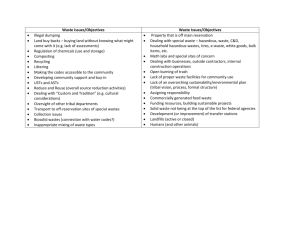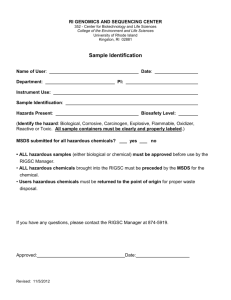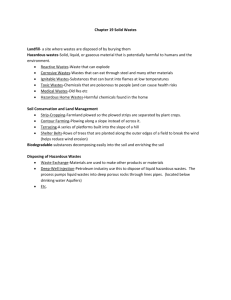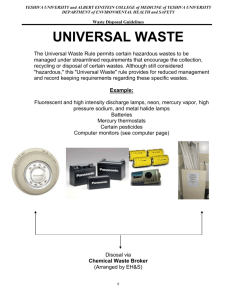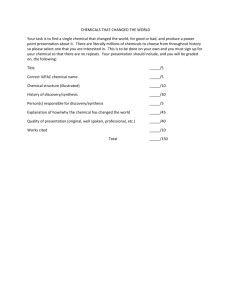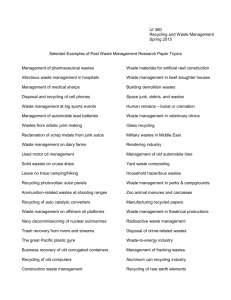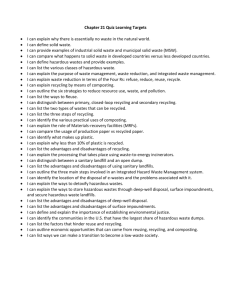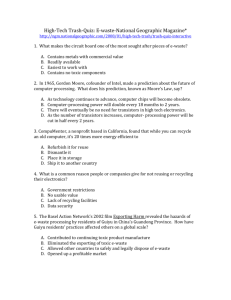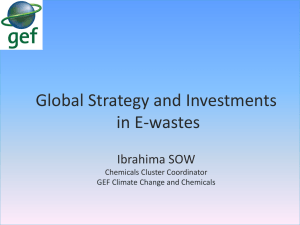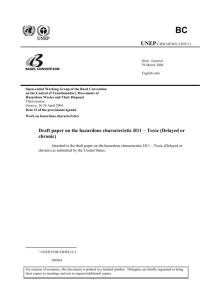Ministerial Lunch on Financing Chemicals and Wastes Hosted by
advertisement
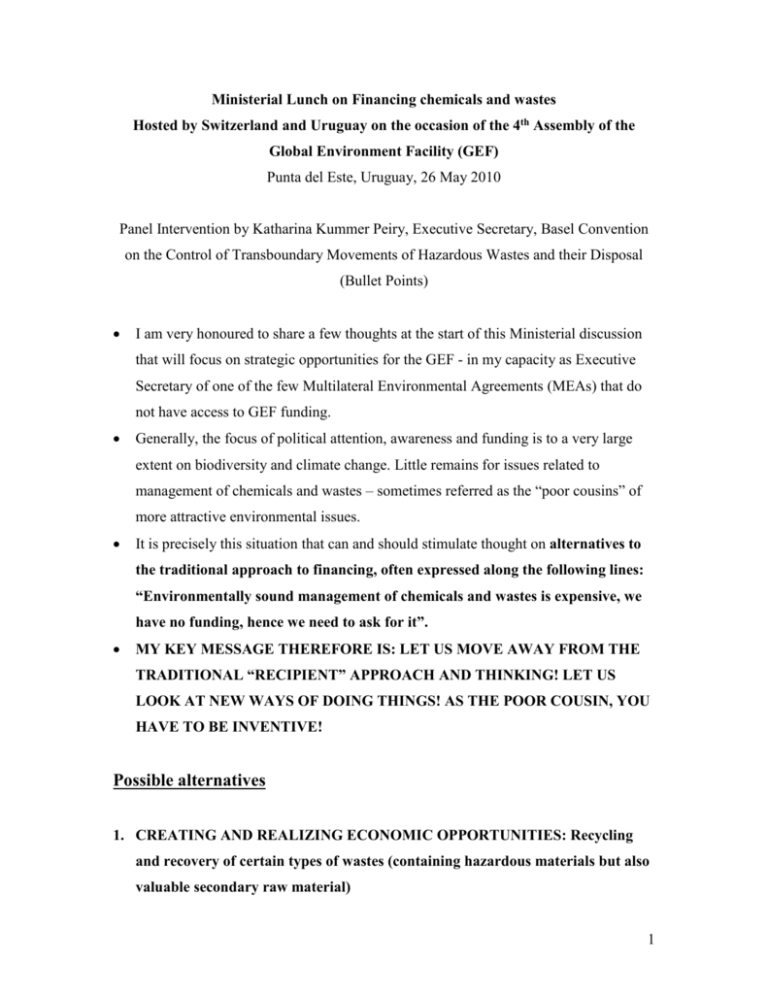
Ministerial Lunch on Financing chemicals and wastes Hosted by Switzerland and Uruguay on the occasion of the 4th Assembly of the Global Environment Facility (GEF) Punta del Este, Uruguay, 26 May 2010 Panel Intervention by Katharina Kummer Peiry, Executive Secretary, Basel Convention on the Control of Transboundary Movements of Hazardous Wastes and their Disposal (Bullet Points) I am very honoured to share a few thoughts at the start of this Ministerial discussion that will focus on strategic opportunities for the GEF - in my capacity as Executive Secretary of one of the few Multilateral Environmental Agreements (MEAs) that do not have access to GEF funding. Generally, the focus of political attention, awareness and funding is to a very large extent on biodiversity and climate change. Little remains for issues related to management of chemicals and wastes – sometimes referred as the “poor cousins” of more attractive environmental issues. It is precisely this situation that can and should stimulate thought on alternatives to the traditional approach to financing, often expressed along the following lines: “Environmentally sound management of chemicals and wastes is expensive, we have no funding, hence we need to ask for it”. MY KEY MESSAGE THEREFORE IS: LET US MOVE AWAY FROM THE TRADITIONAL “RECIPIENT” APPROACH AND THINKING! LET US LOOK AT NEW WAYS OF DOING THINGS! AS THE POOR COUSIN, YOU HAVE TO BE INVENTIVE! Possible alternatives 1. CREATING AND REALIZING ECONOMIC OPPORTUNITIES: Recycling and recovery of certain types of wastes (containing hazardous materials but also valuable secondary raw material) 1 The example of e-waste: o Contain valuable metals becoming increasingly scarce (e.g. colthane) o 30 mobile phones contain as much gold as 1 ton of ore! o Informal recycling: health and environmental impacts (no use of protective gear, contamination of air and water) but: higher income than traditional occupations, e.g. farming. Large numbers of people world-wide depend on informal recycling for their livelihood, directly or indirectly (recent study from Ghana in the framework of the Basel Convention e-waste Africa project) o Recovery rate of gold in a PC: informal recycling 0%, using state of the art technology 91% => It does not make economic sense to invest funding into disposal of e-waste! The challenge is to make the operations environmentally sound, and thus achieve a win-win situation! Alternatives to traditional fund raising approach (examples): o Invest in provision of safe alternatives to informal recycling operations, e.g. seed money for building state of the art recycling facilities that will eventually become profitable o Support initiatives to retain economic opportunities for people in the informal sector but under safe conditions -> combination / cooperation between formal and informal sectors o Partnerships with industry: engage the expertise of the private sector in a way that is beneficial also to them (e.g. public recognition, green business opportunities) – example: Basel Convention Partnership Programe (Mobile Phone Partnership Initiative MPPI, Partnership for Action on Computer Equipment PACE) -> Does obviously not work for all obsolete chemicals and wastes, but where the economic opportunities do exist, they should be realized! 2 2. LIFE CYCLE APPROACH TO CHEMICALS AND WASTES: invest not just in the elimination stage of a hazardous substance but start at the production stage Example: Bridging the Digital Divide initiative / WSIS: in promoting access to ICT in developing countries through relevant projects, already build in components for recycling (my message to in an address to the 13th session of the UN Council on Science and Technology for Development last week!) GEF to favour projects avoiding use of hazardous substances: o Green product design o Chemical leasing o Chemical accident prevention, preparedness and response o Safe recycling / recovery methods o Initiatives for using cleaner / safer alternatives to chemicals e.g. for pest control, fighting diseases etc. (e.g. NGO initiatives) Most of these ideas and approaches are already being discussed in the framework of this GEF Assembly, but not in relation to chemicals and wastes. POSSIBLE APPROACHES NOT DIRECTLY RELATED TO GEF OR OTHER IFIs: 3. RAISING THE PROFILE THROUGH “ATTRACTIVE PACKAGING” / CREATION OF EMOTIONAL APPEAL: Examples where this has been done successfully: o Global Fund to Fight AIDS, Tuberculosis and Malaria o Vaccine Fund of Global Alliance for Vaccines and Immunization (GAVI) o WHO Tobacco Free Initiative Approach initiated by the chemicals / waste MEAs (Basel, Rotterdam and Stockholm Conventions): Safe Planet Campaign 3 Investment into a larger scale PR campaign? Concrete step: 14th Session of Human Rights Council on 8 June 2010 will have an interactive panel discussion on human rights and toxic wastes, in which I have been invited to participate. This will hopefully help to highlight the link between enjoyment of human rights and toxic waste 4. INCLUSION OF CHEMICALS / WASTE MANAGEMENT INTO NATIONAL AND INTERNATIONAL DEVELOPMENT AGENDAS / ACHIEVEMENT OF MILLENNIUM DEVELOPMENT GOALS (MDGs) Recognize that: o Safe chemicals and waste management is an important element of development and achievement of MDGs (protection of human health and livelihood, poverty reduction) o Most donor funding is provided to developing / transition countries on their demand and in accordance with their priorities Direct links between donor and recipient countries to ensure inclusion of chemicals and waste management in national strategies / poverty reduction plans etc. Adjust role of international organizations / MEA Secretariats: facilitate contacts to achieve support of on-the-ground projects Role of Regional Centres /offices and similar entities? Several high-level speakers yesterday have mentioned that we live in an interesting time, a time of change. Perhaps this is also a time to reflect on alternatives to the traditional approaches to financing chemicals and wastes management? 4
